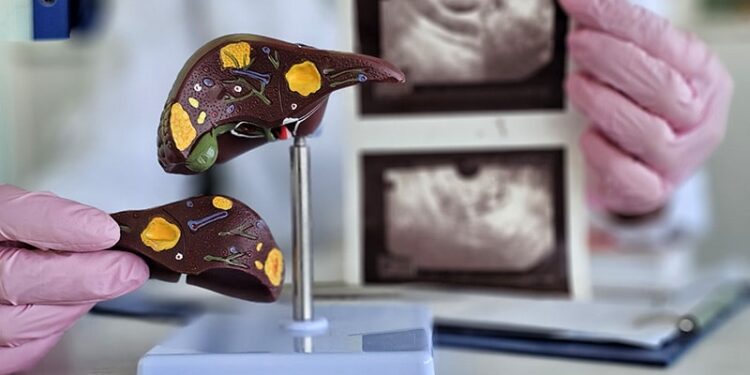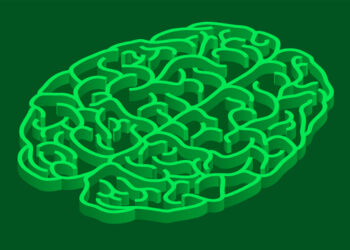TOPLINE:
The combination of ervogastat plus clesacostat was more effective at resolving metabolic dysfunction-associated steatohepatitis (MASH) without worsening fibrosis in patients with biopsy-confirmed MASH and stage II or III fibrosis than placebo and ervogastat alone; however, the combination was associated with a potentially unfavorable lipid profile that may make it less suitable for patients at increased risk for cardiovascular events.
METHODOLOGY:
- Reducing liver fat can help manage MASH; two novel inhibitors of de novo lipogenesis — ervogastat, a diacylglycerol O-acyltransferase 2 (DGAT2) inhibitor, and clesacostat, an acetyl-coenzyme A carboxylase (ACC) inhibitor — have demonstrated effects in lowering liver fat in early clinical trials.
- Researchers conducted a phase 2 clinical trial from June 2020 to February 2024 to assess the efficacy and safety of ervogastat alone and in combination with clesacostat in adults with biopsy-confirmed MASH and stage II or III fibrosis.
- Overall, 255 patients were randomly assigned to receive ervogastat (25 mg, 75 mg, 150 mg, or 300 mg), ervogastat plus clesacostat (150 mg plus 5 mg or 300 mg plus 10 mg), or placebo twice daily for 48 weeks.
- The primary endpoint was the proportion of patients achieving MASH resolution without fibrosis worsening, at least a one-stage fibrosis improvement without MASH worsening, or both at week 48.
TAKEAWAY:
- Both dose levels of ervogastat plus clesacostat met the composite primary endpoint. Compared with 38% of patients receiving placebo, 66% of patients receiving 150 mg ervogastat plus 5 mg clesacostat (difference from placebo, 0.27) and 63% receiving 300 mg ervogastat plus 10 mg clesacostat (difference from placebo, 0.25) achieved the primary endpoint.
- None of the doses of ervogastat alone met the composite primary endpoint.
- Compared with the placebo group, all ervogastat alone and ervogastat plus clesacostat groups achieved greater improvements in MASH resolution without fibrosis worsening (the MASH component of the primary endpoint); however, no treatment group achieved at least a one-stage improvement in fibrosis without MASH worsening compared with the placebo group (the fibrosis component of the primary endpoint).
- Most adverse events were mild or moderate in severity, with the most common adverse events being inadequate control of diabetes and diarrhea. Ervogastat plus clesacostat was associated with increased levels of serum triglycerides, apolipoprotein C-3, and apolipoprotein E.
IN PRACTICE:
“The results from this study expand on the relevance of DGAT2 inhibitors and the DGAT2 inhibitor plus ACC inhibitor combination in potentially treating MASH with liver fibrosis,” the researchers wrote.
“Significant differences relative to placebo were noted only in the combination therapy groups and mainly driven by resolution of MASH,” Manuel Castro Cabezas of the Erasmus Medical Center, Rotterdam, the Netherlands, and Vivian de Jong of UMC Utrecht, Utrecht, the Netherlands, wrote in an accompanying editorial. “Cardiovascular health could be an issue with ervogastat and clesacostat due to the negative effects on serum triglycerides and HDL [high-density lipoprotein] levels seen in this trial,” they added.
SOURCE:
This study, led by Vincent Wai-Sun Wong, MD, The Chinese University of Hong Kong in Hong Kong, China, was published online in The Lancet Gastroenterology & Hepatology.
LIMITATIONS:
The study was completed with 73% of the randomly assigned patients, with recruitment facing challenges during the COVID-19 pandemic. The reduced sample size likely made the placebo response on histology more sensitive to small shifts in the number of patients classified as responders.
DISCLOSURES:
This study was funded by Pfizer, which manufactures ervogastat and clesacostat. Three authors disclosed being full-time employment at Pfizer and/or owning stocks in the company. Other authors declared receiving grants and/or fees and having other ties with many pharmaceutical companies, including Pfizer.
This article was created using several editorial tools, including AI, as part of the process. Human editors reviewed this content before publication.
Source link : https://www.medscape.com/viewarticle/novel-lipogenesis-inhibitor-combo-effective-against-mash-2025a1000lj4?src=rss
Author :
Publish date : 2025-08-14 08:53:00
Copyright for syndicated content belongs to the linked Source.











